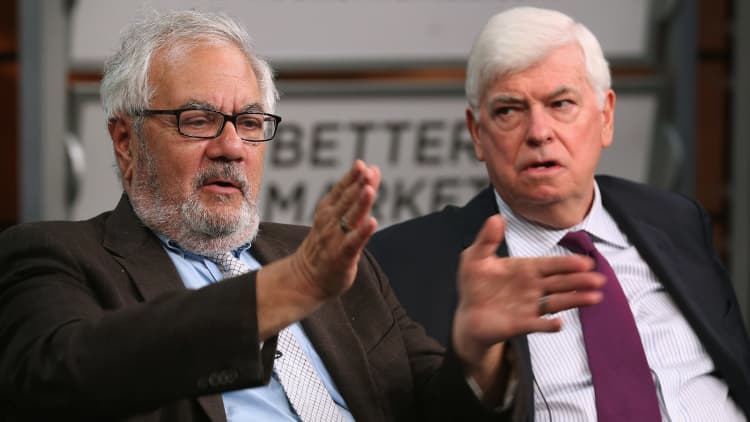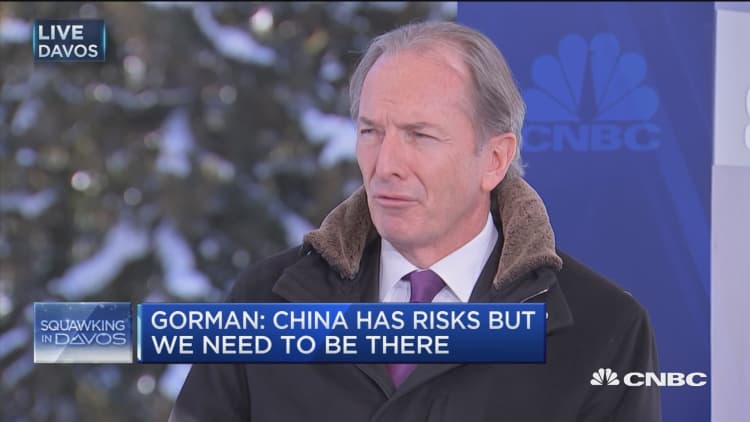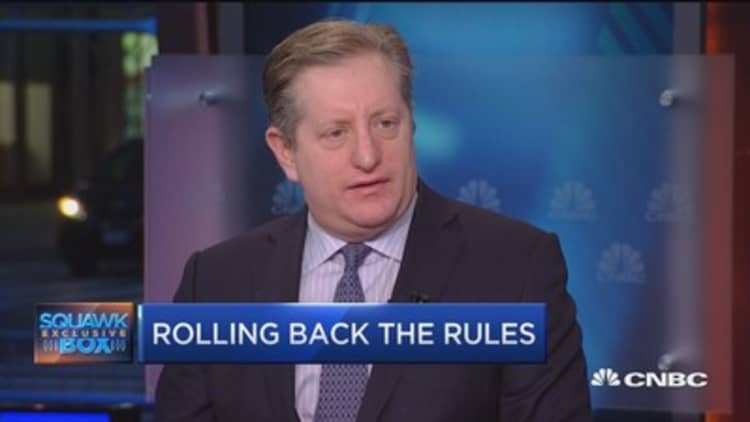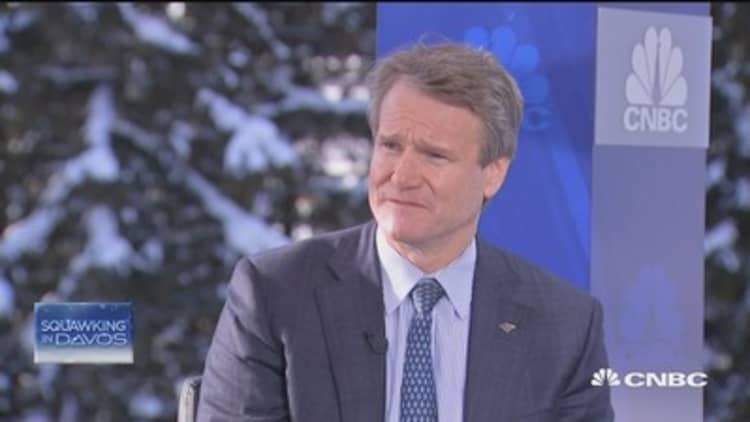
President Donald Trump issued an executive order Friday afternoon directing the Treasury secretary to submit a report on recommended changes to bank regulations in 120 days, and while the details of the order aren't yet known, experts are confidently making a few predictions.
The first thing to know about the changes ahead for banks is that they won't be tailored to let big Wall Street institutions go back to the high-risk practices that triggered the financial crisis.
Rather, the moves will take place more around the edges — cutting compliance costs, freeing up community and regional banks from the same rules as their bulge-bracket peers, and helping out investment advisors who believe they've been targeted unfairly.
The second thing to know about the changes is no one is repealing Dodd-Frank, a term that has become shorthand for the omnibus rules put into place since the crisis.
Getting rid of the entire law would be far too onerous for a $16 trillion industry that already has implemented many of the measures. Unlike the effort to repeal the Affordable Care Act — Obamacare — there's little support for scrapping the entire reform package.
The third thing to know is that those provisions that will change in Dodd-Frank won't go down without a fight.

While Trump can roll back some measures through executive order, there are other provisions that will have to go through the same legislative process that created the law. The president can't simply void a law he doesn't like. Bottom line: major changes to the financial industry are going to take time.
"The promises have been to simplify Dodd-Frank. It will probably be difficult to repeal it," said John Berlau, senior fellow at the Competitive Enterprise Institute, a libertarian think tank. "What has been discussed is to make the playing field a little bit more even" between large institutions and smaller ones.
Trump's order Friday begins what will be a lengthy process toward changing a law he vilified on the campaign trail.
Compliance costs for banks have doubled since Dodd-Frank came into being, with the most recent figure put at $70 billion, or 23 percent of total expenses, according to Federal Financial Analytics.
What Trump cares about most, though, is getting banks to lend money more aggressively.
"We expect to be cutting a lot out of Dodd-Frank," the president said Friday while meeting with his business advisory council. "Frankly, I have so many people, friends of mine, that have nice businesses that can't borrow money. They just can't get any money because the banks won't let them borrow because of rules and regulations in Dodd-Frank."
Put broadly, Dodd-Frank mandated higher capital levels for banks, created the Consumer Financial Protection Bureau to stop loan abuses that proliferated in the years leading up to the crisis, and stopped banks from engaging in risky trading practices for their own benefit. The CFPB is expected to undergo significant changes and its leader may be replaced.
It also established what's known as the "fiduciary rule," which requires investment advisors to act primarily in their clients' interest. The measure will be one of the White House's main targets, but also could be one of the most cumbersome to roll back. The administration likely will ask the Labor Department to delay the April 10 implementation.
"We expect much of the focus of the action to be on opening access to credit, promoting economic growth, and removing burdensome regulations," analysts at investment bank FBR said in a note to clients. "Many of the regulations created by Dodd-Frank would be difficult to eliminate without action from Congress, but there are a number of changes that regulators can make (especially on the enforcement of these rules) which could have a significant impact on the business models of banks and other financial services firms."
There's going to be a big fight about all their measures. You can't just wave a magic wand and say the fiduciary rule is wrongMichael S. Barrlaw professor, University of Michigan
Big Wall Street banks, though, are only getting limited relief. Trump attacked them during the campaign as well, and they're unlikely to find many sympathetic ears around Capitol Hill.
They aren't, for instance, going to get any breaks in terms of capital they have to maintain. They may get some help with laws restricting their trading activities — under the so-called Volcker rule — but that mainly will come in terms of the volume of paperwork they must file to show they're in compliance.
Regional and community banks will be getting some capital relief, which likely will come in the form of raising the level of assets a bank must hold in order to come under regulatory scrutiny. The net result would be less regulation on smaller banks.
But the major banks "are very unlikely to escape from the broadest rules. Plus the reality is they have international operations, so many of them would be subject to other rules anyway," said Joo-Yung Lee, managing director for financial institution analysis at Fitch Ratings.

"I don't think banks are going to go back to prop trading," she added. "The capital rules may get pretty unfavorable to do so, and many of the banks have acknowledged that's not where they want to do. It's really about the burden of proof, the reporting requirements around Volcker."
To be sure, few of the changes will go off without a hitch.
Any talk of rolling back bank regulations immediately sparks blowback from those who worry about a return to Wall Street's Wild West days. Congressional Democrats already are lining up to oppose the moves ahead.
"I don't think it's a fait accompli at all," said Michael S. Barr, a law professor at the University of Michigan and editor of the nonpartisan Russell Sage Foundation's journal, Financial Reform: Preventing the Next Crisis. "There's going to be a big fight about all their measures. You can't just wave a magic wand and say the fiduciary rule is wrong."
Indeed, repealing the rule could be the most controversial move. While sounding like a common sense measure — getting fiduciaries to put clients first — industry advocates say it ultimately will limit choice and prove costly to investors.
"It might be harder for some of the firms that have already taken some actions regarding their fiduciary rule plans to change what they've articulated," Lee said. "So I think it really depends on the nature or the depth of the rule's scope."



